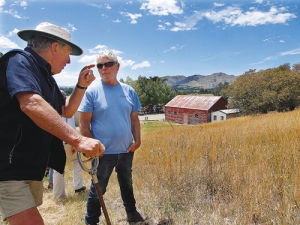NZ kiwifruit sector on alert for mysterious Italian disease
New Zealand's kiwifruit industry is on alert following reports of a mystery disease that is sweeping through Italian orchards.
 Mount Beautiful vineyard manager Finn Grieve, right, talks to farmer John Mason about the Chilean needle grass behind him.
Mount Beautiful vineyard manager Finn Grieve, right, talks to farmer John Mason about the Chilean needle grass behind him.
As far as farming nightmares go, finding an invasive biosecurity pest on your farm ranks up there with the worst of them.
And for many farmers nationwide that nightmare is real when they discover Chilean needle grass on their farm.
The prickly pest is an arable equivalent of the Terminator of cinema fame. It's hard to kill, resistant to temperature change and difficult to identify – unless it is in seed. It can lie dormant in the soil for at least 10 years ready to surface when conditions are ripe.
The weed has infested at least 110 sites in Hawkes Bay and a further 110 sites in Marlborough, but is only a recent invader in Canterbury with only 14 sites discovered.
The regional council, Environment Canterbury, has joined forces with farmers to battle the pest in the hope of containing it.
ECan principal biosecurity advisor Laurence Smith hosted a field day for interested parties last week at the Cheviot school hall. A morning of presentations was followed by a visit to two sites where Chilean needle grass has been discovered, showing the success of containment efforts.
Containment is the key for the 160ha Mount Beautiful vineyard, nestled in the rolling hills north of Cheviot, where Chilean needle grass was discovered in 2008. Since then the vineyard has effectively become an island as they have implemented extensive biosecurity protocols to keep the pest at bay.
Vineyard manager Finn Grieve has supervised an effort that includes a washdown pad for vehicles that have been off road and are now leaving the site. All on-site machinery is also washed down after use to limit the spread around the farm.
All 23 workers on the site have been educated on how to spot it and all vehicles have info stickers. All grass stays on the vineyard and all the gates were locked. A buffer zone is sprayed around the vineyard each spring.
All this is doubly impressive since the vineyard has done this for the community's benefit: Chilean needle grass has no effect on their business, but would have a devastating effect on the surrounding farms if it spread.
The containment sump for the washdown pad cost the vineyard $50,000 to build.
Grieve hopes that with their aggressive programme of identifying, spraying and mowing that in 10 years they will have sent the grass packing.
The second site visited was the farm of Carl Forrester, where a slightly different approach has been taken. Forrester discovered Chilean needle grass not long after he bought the farm in 2011 and with ECAN's help has been able to effectively manage it.
After helicopter spraying and burning the land, then tractor and knapsack spraying, Forrester planted the affected land with a mixture of lucerne, Italian ryegrass and oats, which is too much competition for the Chilean needle grass.
Smith says if you can crop the ground where the grass is you can manage it.
Forrester offered key pieces of advice such as don't panic, close off the block and concentrate on each site one at a time.
Timing of spraying is important and tractor spraying for them appeared more successful than helicopter spraying; brassicas and short rotation grasses are all good crops to suppress the Chilean needle grass; get stock off the paddocks before it goes to seed and send them straight to the works.
For ECAN's Laurence Smith Chilean needle grass is only one of 88 pests he has to battle in Canterbury, but for him the effort is worth it if they can keep it contained. He fears seeing it get established on steep hill country where containment options are limited.
Humbling, overwhelming, and an absolute honour. That’s how 2024 Fonterra Dairy Woman of the Year Katrina Roberts describes her win at the Dairy Women’s Network conference earlier this month.
Hamilton-based Dairy Goat Co-operative (DGC) is revamping its leadership in the hope of recovering from its financial doldrums.
With just over two weeks left in the 2023-24 season, all eyes will be on Fonterra's opening milk price for the new season.
Fonterra Brands' Cathy Lang has been crowned the country's best cheesemaker for the second time in three years.
James and Debbie Stewart of Dairylands in the Manawatū are no strangers to taking home the silverware.
Troubled milk processor Synlait's share price is taking a hammering as nervous investors offload their stakes.

OPINION: This old mutt well remembers the wailing, whining and gnashing of teeth by former West Coast MP and Labour…
OPINION: Your canine crusader gets a little fed up with the some in media, union hacks, opposition politicians and hard-core…